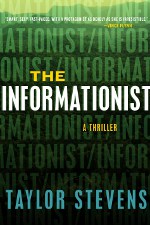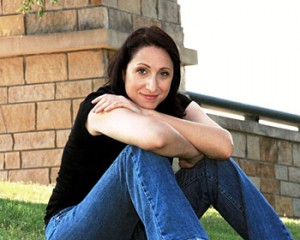The Informationist by Taylor Stevens
by Karen Harper

 Recently, I sat down with Taylor Stevens to talk about her new novel, The Informationist – a debut thriller about Vanessa Munroe–a resourceful loner who grew up overseas and has combat training, a wry sense of humor, and plenty of sex appeal. Munroe deals in information–expensive information–working for corporations, heads of state, private clients, and anyone else who can pay for her unique brand of expertise.
Recently, I sat down with Taylor Stevens to talk about her new novel, The Informationist – a debut thriller about Vanessa Munroe–a resourceful loner who grew up overseas and has combat training, a wry sense of humor, and plenty of sex appeal. Munroe deals in information–expensive information–working for corporations, heads of state, private clients, and anyone else who can pay for her unique brand of expertise.
Q: Can you tell us a little about the story? It’s quite unusual and has been getting a lot of pre-pub buzz.
Vanessa “Michael” Munroe is a resourceful loner who grew up overseas. She deals in information–expensive information–working for corporations, heads of state, private clients, and anyone else who can pay for her unique brand of expertise. A Texas oil billionaire hires her to find his daughter who vanished in Africa four years ago. Pulled into the mystery of the missing girl, Munroe finds herself back in the land of her childhood, betrayed, cut off from civilization, and left for dead. To escape the jungle, she must come face-to-face with the past that she’s tried for so long to forget. As Family Circle so eloquently put it, “…in this breathless, international thrill ride… Vanessa lies, kills and uses her incredible gift for getting what she wants. But underneath all the action is an even more powerful story of a woman trying to make peace with her personal demons.”
Q: The title alone is intriguing. Exactly what is an informationist? Did you interview any people in this career and did you fictionalize any of this job?
 The title, in essence, describes the heroine of the story, who she is and what she does for a living: her world revolves around the acquisition of information, and she will do whatever it takes to acquire it and get the job done as long as she isn’t caught. She is not patriotic, as a spy who works for her country, she doesn’t abide the boundaries of law, as would a PI, and getting what she wants often involves putting herself in high risk situations. There may be people who deal in information the way that she does, but if they exist I’ve never met them.
The title, in essence, describes the heroine of the story, who she is and what she does for a living: her world revolves around the acquisition of information, and she will do whatever it takes to acquire it and get the job done as long as she isn’t caught. She is not patriotic, as a spy who works for her country, she doesn’t abide the boundaries of law, as would a PI, and getting what she wants often involves putting herself in high risk situations. There may be people who deal in information the way that she does, but if they exist I’ve never met them.
Q: Your bio (for full details, readers should visit your interesting website www.taylorstevensbooks.com) is one of the most amazing I’ve read. Not many authors have lived in Africa, had to panhandle to survive, and were born into an unusual religious sect. Does your heroine, Vanessa Munroe, share any of this challenging background, or is she at least inspired by your past? Or to ask this another way, is your heroine you in any way?
If I could pick an alter-ego, Munroe would definitely be the one, but she’s not me and I’m not her, although there are certainly touches of me in her: the hijacked childhood, the having no home to return to, and always being the outsider looking in. Having spent a good part of my life craving knowledge and making up the educational deficit by teaching myself, it also came naturally to create a character whose world revolved around seeking information.
Q: Your work has been reviewed enthusiastically by some of the best thriller writers in the business. Also your Publishers Weekly boxed, starred review compares your heroine’s “feral, take-no-prisoners attitude to Stieg Larsson’s Lisbeth Salander.” American readers are obviously ready for and drawn to this tough kind of heroine. Do you have any theories as to why?
I suspect this is partly due to our cultural norms and expectations changing throughout the decades, but at the same time, perhaps we’ve been ready for and drawn to this tough kind of heroine for quite some time, and there simply haven’t been enough of them to fill the void. I imagine that if our books were primarily filled with strong female characters and very few capable men, that when those men eventually arrived in print, they would be well-received.
Q: Central Africa is an unusual setting. During your years in Africa, what especially spoke to you (or terrified you) about the so-called “Dark Continent” which you have used in this book?
So much of THE INFORMATIONIST takes place within Africa—most of that inside Equatorial Guinea—that it’s difficult to separate just one aspect used in the story as being particularly relevant to life on the continent. I’m often asked how much of the setting is real, and if any of the events described within Malabo, the country’s capital, could have ever actually happened. They would, and they did, and most of the Malabo scenes were drawn from real life experience.
However, Africa is extremely vast and also varied. Due to distortion in map-making, it is really difficult to see just how expansive it is. Considering that the continent is large enough to hold the United States, China, India and most of Europe combined helps to provide perspective. That is to say, that although there are many similarities from one African nation to another, there are also many differences, and Equatorial Guinea was an extreme version of what I’d experienced elsewhere.
Q: Michael Palmer, author of The Last Surgeon, says you are a born storyteller. Was this talent born or made in you?
Given the trajectory of my life, I would venture that it’s a combination of both. I was born and raised in the Children of God, an apocalyptic religious cult that didn’t believe in education beyond sixth grade, so for most of my life up until about two years before I started writing, I’d had very little access to reading material other than what the cult produced. To this day I am sorely under-read and still rather painfully oblivious to current trends. Compounding this lack of access, I had started writing as a young teenager, and when cult leaders became aware of this, my hand-written notebooks were confiscated and burned, and I was forbidden to write fiction again.
When, as an adult, I was free of the cult, I set out once more to write, but really had no idea what I was doing. I’d never taken a writing course or studied creative writing—hadn’t even managed to get through 6th grade English—didn’t know how to plot or how to build characters, and I learned all of this and much more through the experience of writing THE INFORMATIONIST.
To this end, I’m often asked how, with no formal training, I was able to learn to write as I do: this is the big mystery to which I have no answer. I expect that somewhat like my character Michael Munroe, who is gifted and absorbs language, I too, absorb language, albeit in the written form, and once I was finally able to access books and work with the written word, that gift blossomed.
Q: Readers are always interested in how authors balance the “real world” of their novels with their “real life” of family and kids. Do you have any secrets of success to pass on? A set routine or flex time for writing? Any tips for beginning writers to get the job done when so much beckons outside the door and window?
Personally, I’m my most productive at night and into the wee morning hours, but since I’m up early in the morning in order to get my children off to school, and since I don’t function well without sleep, this also means I’m rarely able to access my most productive hours. Instead, I work around their schedule, and by work I mean mostly procrastinate until I realize that they’ll be home from school any minute, at which time the noise level will return to filled-stadium loud, so I’d better actually put some words down.
The only secret of success that I might offer, is the importance of focus—of writing every day, and writing even when you don’t feel like it and when there’s no inspiration. The words don’t have to be pretty, the story doesn’t have to be perfect, but it does have to be finished before you can make it pretty and perfect.
Q: Can you tell us a bit about what you are working on now/next?
I’m currently into the third installment of the Michael Munroe series, but since it’s still very much in a rudimentary phase, I can tell you that THE INNOCENT, the second book, draws heavily on my childhood of having been raised within The Children of God, and although the story is fiction, it’s based on truth and probably the closest I’ll ever get to writing an autobiography.
- Kaanapali Beach Paradise by R. Barri Flowers - February 29, 2020
- Mortal Music by Ann Parker - January 31, 2020
- Always Look Twice by Elizabeth Goddard - September 30, 2019
